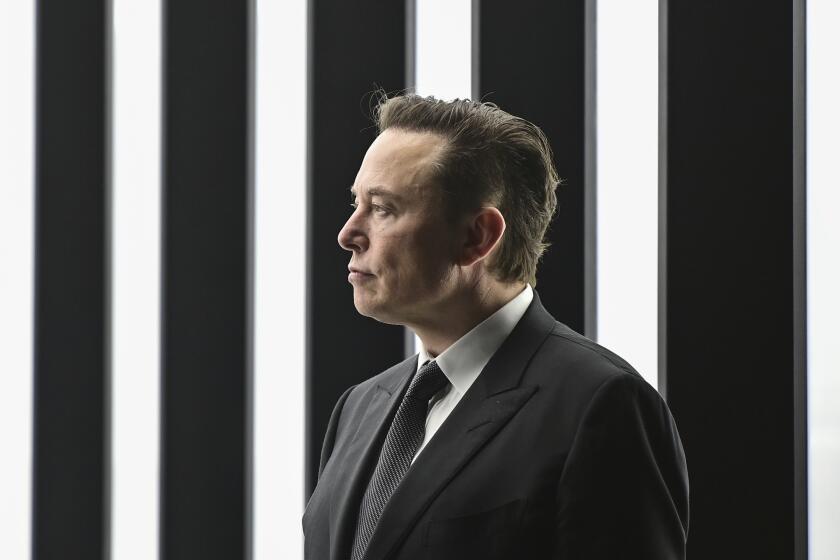Scientists used to love Twitter. Thanks to Elon Musk, they’re giving up on it

- Share via
In the first couple of years of the COVID-19 pandemic, Peter Hotez, an expert in vaccines and tropical medicine at Baylor University, found Twitter to be “a useful and at times almost essential tool for timely and important exchange of information.”
The platform banned the most aggressive anti-vaccine and anti-science trolls, leaving a relatively safe space “for mainstream physicians, epidemiologists, and biomedical scientists to share their unpublished findings” or make others aware of recent postings on professional sites.
After Elon Musk acquired the site in October 2022, he reopened its gates to trolls trying to counteract sound science with misinformation and outright lies and attacking responsible researchers with harassment and death threats. (He has also rebranded the site as “X,” for no discernible reason.)
Twitter has become such a toxic place that you almost wonder, when is it no longer constructive to post on it.
— Timothy Caulfield, University of Alberta
“Now it’s just a cesspool of trolls and bots” dispensing hate, Hotez says. He no longer allows users to post replies to his tweets because of the trolls’ torrent of “death threats and fascination with Nazi and other hate symbols.” And he has reduced all his activities online.
Hotez is not alone in mourning the disintegration of this once-indispensable social media platform. Scientists are abandoning X in droves, according to a recent survey by Nature. Of the survey respondents, “more than half reported that they have reduced the time they spend on the platform in the past six months and just under 7% have stopped using it altogether.”
Get the latest from Michael Hiltzik
Commentary on economics and more from a Pulitzer Prize winner.
You may occasionally receive promotional content from the Los Angeles Times.
The survey attributed the decline in usage to Musk’s “largely unpopular changes to Twitter, including cutting down on content moderation; ditching its ‘blue-check’ verification system in favor of one that grants paying members additional clout and privileges; charging money for access to data for research; [and] limiting the number of tweets users can see.”
And it was conducted before Musk said the platform would eliminate the ability to block harassers.
Concerns about the decline of X as a source of reliable information extends beyond the scientific and academic communities. During the apparent coup attempt in Russia in June, journalists noticed its relative uselessness at helping them find real-time, breaking information from the ground and sifting fact from fakery, due in part to Musk’s trashing of its account verification system.
Public safety officials such as weather forecasters and emergency managers have expressed fears that the site’s deterioration will interfere with their efforts to disseminate urgent messages to residents of a crisis zone and inundate them instead with dangerous misinformation from unverified but seemingly genuine accounts.
Within minutes of Damar Hamlin’s collapse on the field, the anti-vax crowd was claiming that it was caused by the COVID-19 vaccine. They should be ashamed
Sure enough, during the Maui fires, X quickly became filled with conspiracy theories about the disaster’s cause.
Still, it’s in the scientific and academic communities where Twitter’s onetime promise seems to have evaporated the most.
Only a few years ago, using Twitter “became almost the norm,” says Timothy Caulfield, an expert in science communication at the University of Alberta and a veteran debunker of pseudoscience. “Academics and scholars were encouraged to go to places like Twitter to build their community, to disseminate their research and to create content the general public, policy-makers and the media could access.”
As long ago as 2014, Twitter stood out in a Nature survey as a general, nontechnical social media site that researchers could consult on their own initiative to follow discussions, discover peers and content, post their own work and follow and comment on scientific discussions.
By late 2022, in the pre-Musk period, more than a third of all scientific papers were getting tweeted, according to a group of European researchers; in the first 12 months of the pandemic, they found, “more than half of all journal articles on COVID-19 ... were mentioned at least once on Twitter.”
Despite the political discord caused by the pandemic, Twitter remained a valued “sounding board, megaphone and common room,” Nature reported last December, calling the platform “a place to broadcast research findings, debate issues in academia and interact with people who they wouldn’t normally meet up with.”
By then, however, scientists were already anxious about the platform’s continued value as a communications tool.
Elon Musk is doing his best to drive reasonable Twitter users away by promoting false accusations against Fauci and anti-LGBTQ conspiracy-mongering.
Almost immediately after taking ownership of Twitter on Oct. 27, Musk eviscerated its content moderation team. On Nov. 23, Twitter announced that it is “no longer enforcing the COVID-19 misleading information policy,” which had been in place since early 2021 and was crucial in suppressing dangerous disinformation about the pandemic.
For some researchers, the last straw was a Dec. 11 Musk tweet in which he stated, “My pronouns are prosecute/Fauci.”
The tweet did more than mock the LGBTQ+ rights movement, members of which often post their preferred pronouns online; it aligned Musk with the witless efforts of right-wingers like Florida’s buffoonish Republican governor, Ron DeSantis, to turn Anthony Fauci, a revered expert in virology and immunology, into a villain — even a putative criminal — because of his advocacy of sound anti-pandemic policies.
University of Washington biologist Carl T. Bergstrom wrote on the social media platform Mastodon that Musk’s tweet was “the straw that broke the camel’s back” for him, prompting him to leave Twitter.
“You can’t have meaningful and productive scientific collaboration on a platform run by a right-wing troll who denies science when its results are inconvenient to him and just simply to hear his audience cheer,” Bergstrom wrote.
Fauci had already received death threats from members of this benighted group, resulting in the government placing him under the protection of armed federal agents. Asked about the Musk tweet, Fauci labeled Twitter, accurately, “a cesspool of information.”
Elon Musk is magnifying hate speech and extremist tropes on Twitter, making the platform the ‘free-for-all hellscape’ he promised to avoid.
Musk’s vast reach on Twitter, Fauci said, “stirs up a lot of hate in people who have no idea why they’re hating — they’re hating because somebody like that is tweeting about it.”
That’s not to say that the platform was ever devoid of misinformation or even harassment, Hotez and Caulfield agree. But the tools existed to wean them out, and the balance of good versus bad tended to tip toward the former.
“In the early days, 10% to 20% of the replies and engagement I got were negative — trolls and harassment,” Caulfield told me. “Now, it’s 90%, and for some of my posts, 100% — trolls, harassment, death threats.”
Topics that have been infected with right-wing ideology bring out the most toxic responses, Caulfield says, such as vaccines, LGBTQ+ issues and climate change.
“Twitter has also always been a forum for threats against scientists, but it’s gotten worse under Elon,” agrees Angela Rasmussen, a virologist who studies the virus that causes COVID-19. “Previously, enough threats would result in suspension or removal from the platform. Now it’s a free for all, with people openly threatening others with physical and sexual violence, saying unguardedly bigoted things and unambiguous hate speech, and sometimes getting unvarnished praise from Elon for doing so.”
Today the question in many scientists’ minds is where to find an alternative to X. There’s no scarcity of choices — the social media sites Mastodon, Spoutible, Bluesky and Threads (a service of Meta) have all offered themselves as Twitter-like platforms, as have many others.
But none has yet come close to the critical mass of users that the old Twitter assembled, nor the ability to curate one’s own set of accounts to follow or followers to accept. Most lack the ease of use valued by experienced Twitter users. And the very abundance of options works against any one of them supplanting X in the near term.
As a result, many scientists and other users are hanging on to X, hoping that a single alternative will emerge or, more optimistically, that X’s glide path will be reversed before it becomes utterly worthless.
Caulfield, like many other users, already has found himself thinking harder before tweeting about research that might draw out the trolls, racists, Nazis and other ghouls whom Musk has welcomed back onto the platform.
“Twitter has become such a toxic place that you almost wonder, when is it no longer constructive to post on it,” Caulfield says. “It’s gotten really dark. I’ve always thought that if we leave, we just make room for more trolls, more misinformation, more rage, and to have science-informed content on Twitter remains important, because you don’t want the dark forces to win. That’s still my position, but I’m wavering.”
More to Read
Get the latest from Michael Hiltzik
Commentary on economics and more from a Pulitzer Prize winner.
You may occasionally receive promotional content from the Los Angeles Times.














